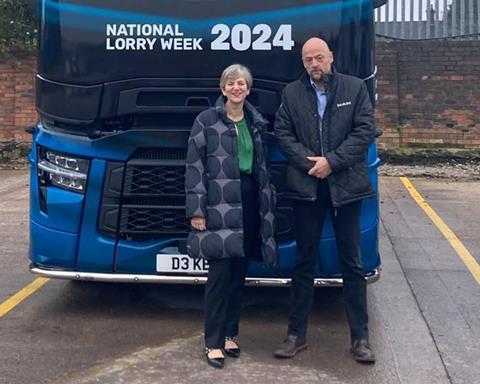Future of roads minister Lilian Greenwood has told MT that the transition to zero emission vehicles will be “difficult” and “expensive” for HGV fleet operators.
However, the MP for Nottingham South pledged to maintain the government’s electric plug-in truck grant and insisted its Zero Emission HGV infrastructure Demonstrator (ZEHID) programme, announced in October 2023, would ultimately provide a pathway to electrified freight transport.
“I appreciate that the costs of electric or hydrogen fuel cell trucks are expensive and that’s why we’re committed to supporting the transition through the plug-in truck grant, and in the recent Budget this was extended,” Greenwood said. “Small trucks can receive a grant of up to £16,000 and large trucks up to £25,000.”
From 2040 all new HGVs sold in the UK must be zero emission, leaving many long-haul HGV operators under potentially crippling financial pressure to buy electric vehicles despite a total absence of charging facilities.
Responding to suggestions that time was running out to provide adequate support to the sector, Greenwood said: “We have the Zero Emission HGV and Infrastructure Demonstrator (ZEHID) programme and I recently met some colleagues involved in that. We’re seeing that rolling out over the next year or two and we’ll be able to see how those operate in real time and how fleets find operating those vehicles and what the challenges are.”
Delivered in partnership with Innovate UK, the £200m government investment from the ZEHID programme aims to deliver around 57 refuelling and electric charging sites, providing infrastructure to help the haulage sector decarbonise.
However, MT reported earlier this week that the programme has encountered challenges installing public charging facilities, due to a shortage of suitable sites and planning problems.
Hitachi ZeroCarbon and Gridserve, which is leading the programme, said Moto’s MSA at Tamworth had become the first site to receive planning permission supported by its electric freightway development, but it added that there remained hurdles to overcome.
Responding, Greenwood said: “Part of the whole ZEHID programme is putting in the infrastructure and seeing how that works and we are seeing a big increase in the roll-out of charge point technology, albeit not primarily aimed at the heavy goods vehicle market. But we know that the infrastructure needs to be there to give the industry confidence to invest in the future.”
Asked why the UK HGV sector is lagging behind other European countries in its journey to net zero, and why there are still only around 350 electric trucks on UK roads, Greenwood said: “I’ve only been in the job for a matter of a few months. We absolutely need to reach net zero and we need to work with the industry to give them the support to help to make that transition
“I acknowledge that it’s difficult because of the difference in cost between diesel and new forms of traction. That’s precisely why we’re putting in this extra support and the demonstrator programme so we can give the industry the confidence to invest and move forward to the future.”
She added that the journey to net zero for HGV operators was “a common problem across the whole of Europe”.
“We’re all facing the challenge of reaching net zero and we know that for heavier vehicles it’s an even harder challenge,” she concluded. “But that’s precisely why we’ve got the Freight Innovation Fund; there’s £200m for that and the ZEHID demonstrator programme. That’s precisely why we’re providing that support through the plug-in truck grant. We want to work with and listen to the industry to make sure we’re doing the things to help them to make this transisiton so we can have cleaner and greener vehicles on our roads, including the freight sector.”















